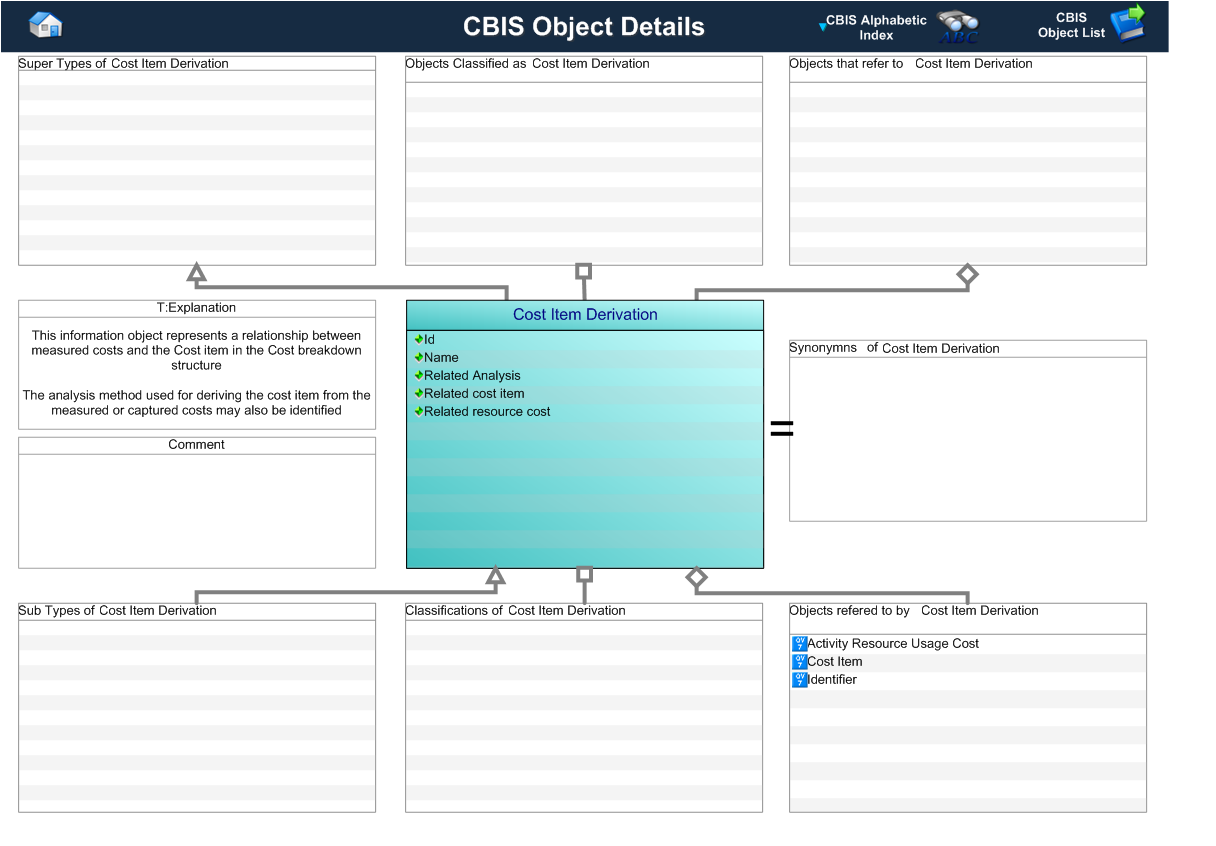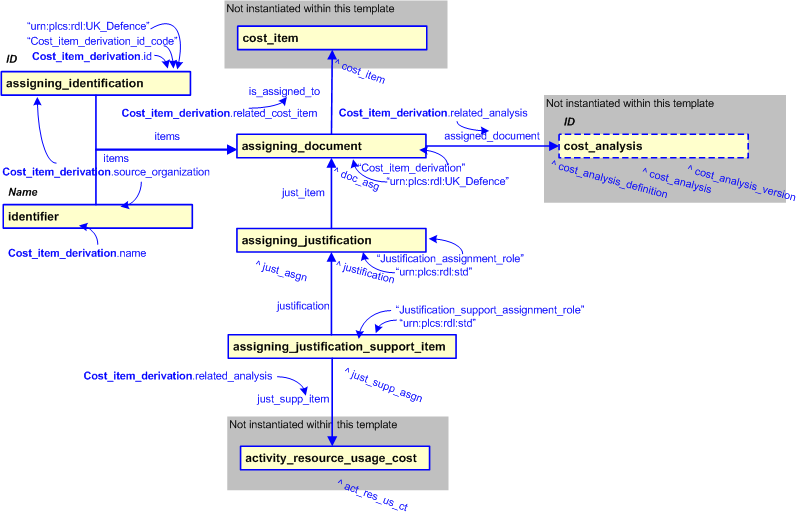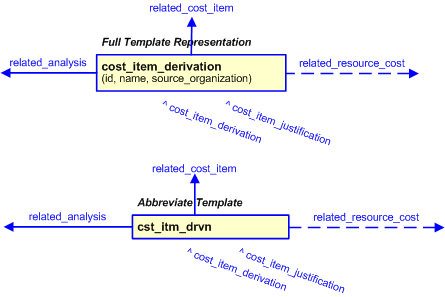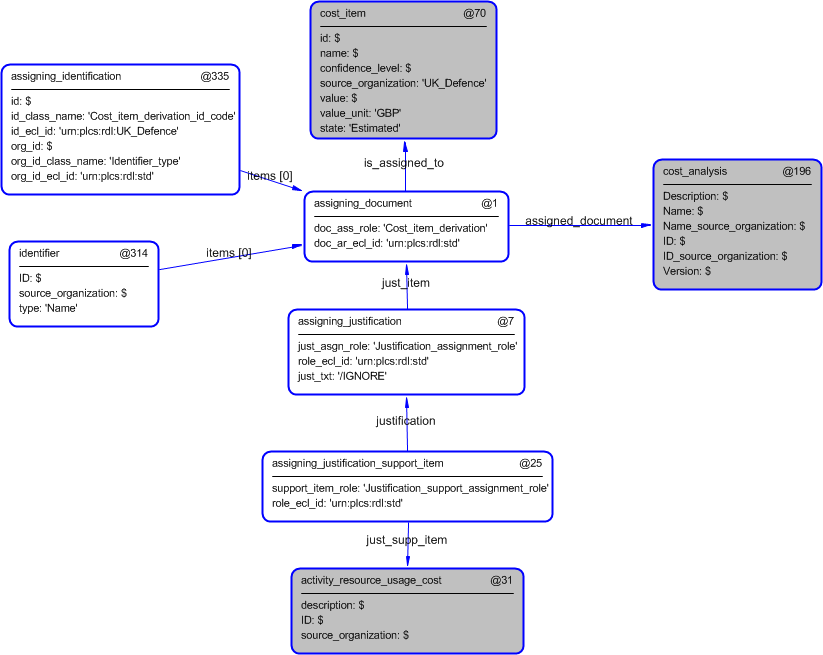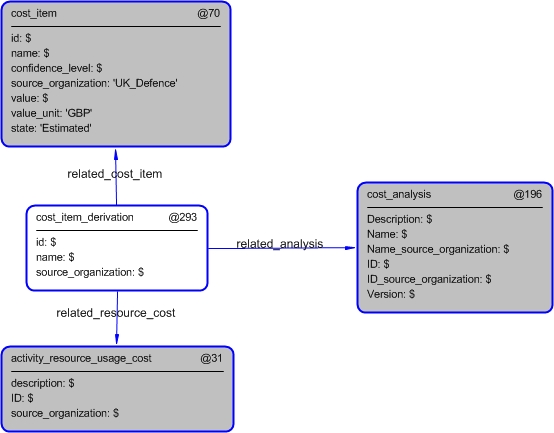Template:— cost_item_derivation (cst_itm_drvn)
Context:— UK_Defence |
Date: 2010/03/15 14:22:42
Revision: 1.2
|
This section specifies the template cost_item_derivation.
NOTE
The template has been defined in the context of
UK_Defence.
Refer to the business context for details of related templates.
NOTE
An explanation of a template and the associated instantiation path is
provided in the
Template overview
section.
This template describes how to represent the UK_Defence concept of "Cost Item Derivation" in terms of PLCS model elements
(templates, entities, and reference data).
The Cost Item business object is used by those UK_Defence Data Exchange Specifications that require information about
the derivation of a particular cost item.
Figure 1 — Graphical Representation for Business Object Cost Item Derivation
Cost Item Derivation
The definition of the Cost Item Derivation object is:
This information object represents a relationship between measured costs and the Cost item in the Cost breakdown structure.
The analysis method used for deriving the cost item from the measured or captured costs may also be identified.
|
Attribute name
|
Attribute description
|
Attribute type
|
Optionality
|
| Id |
The identifier of the Cost Item Derivation relationship. |
Intrinsic |
Mandatory |
| Name |
The name of the Cost Item Derivation relationship. |
Intrinsic |
Mandatory |
| Related Analysis |
This is a reference to the analysis used to derive the actual cost. |
Relationship to Cost Analysis |
Mandatory |
| Related cost item |
This is a reference to the related Cost item. |
Relationship to Cost Item |
Mandatory |
| Related resource cost |
This is a reference to the related activity resource usage cost. |
Relationship to Activity Resource Usage Cost |
Optional |
Table 1 — Cost Item Relationship attribute details.
The EXPRESS-G diagram in
Figure
2
shows the templates and EXPRESS entities that are required
to represent the template
"cost_item_derivation".
The text highlighted in blue shows the template parameters.
Figure 2 — An EXPRESS-G representation of the Information model for cost_item_derivation
The graphic for the template to be used in other EXPRESS-G diagrams
is shown in Figure
3
below.
Figure 3 — The graphical representation of the cost_item_derivation template
The following input parameters are defined for this template:
The identifier of the Cost Item Derivation relationship.
The name of the Cost Item Derivation relationship.
The identifier of the organization responsible for identifying the Cost Item Derivation relationship.
This is a reference to the analysis used to derive the actual cost.
This is a reference to the related Cost item.
This is a reference to the related activity resource usage cost.
The following reference parameters are defined for this template:
Allow the
Document_assignment
entity instantiated in this path to be referenced when this template is used.
%^target = $cost_item_derivation.cost_item_derivation%
%^target = $cost_item_derivation.cost_item_justification%
The instantiation path shown below specifies the entities that are to be
instantiated by the template.
A description of templates and the syntax for the instantiation path is
provided in the
Templates Help/Information section.
-- setup the root for the template /
assigning_document(
assigned_document=@related_analysis,
doc_ass_role='Cost_item_derivation',
doc_ar_ecl_id='urn:plcs:rdl:UK_Defence',
is_assigned_to=@related_cost_item)/
-- assign ref param %^cost_item_derivation = $assigning_document.doc_asg%
/
assigning_identification(
id=@id,
id_class_name='Cost_item_derivation_id_code',
id_ecl_id='urn:plcs:rdl:UK_Defence',
org_id=@source_organization,
org_id_class_name='Identifier_type',
org_id_ecl_id='urn:plcs:rdl:std',
items=^cost_item_derivation)/
-- provide the name of the Cost item type /
identifier(
ID=@name,
source_organization=@source_organization,
type='Identifier_type',
items=^cost_item_derivation)/
-- setup the justification /
assigning_justification(
just_item=^cost_item_derivation,
just_asgn_role='Justification_assignment_role',
role_ecl_id='urn:plcs:rdl:std',
just_txt='/IGNORE')/
-- assign ref param %^cost_item_justification = $assigning_justification.just_asgn%
-- [Optional 0:1 related_resource_cost] /
assigning_justification_support_item(
support_item_role='Justification_support_assignment_role',
role_ecl_id='urn:plcs:rdl:std',
justification=^cost_item_justification,
just_supp_item=@related_resource_cost)/
The instance diagram in Figure
4
shows an example of the EXPRESS entities and templates that are instantiated by the template:
/cost_item_derivation(id='', name='', source_organization='', related_cost_item='@70', related_cost_analysis='@196', related_resource_cost='@31')/
(an illustration of the consolidated cost_item_derivation template is shown in
Figure
5 below.)
Figure 4 — Entities instantiated by cost_item_derivation template
The instance diagram in
Figure
5
shows the graphic symbol for the template that is to be
used in other instance diagrams. The example template is:
/cost_item_derivation(id='', name='', source_organization='', related_cost_item='@70', related_cost_analysis='@196', related_resource_cost='@31')/
Figure 5 — Instantiation of cost_item_derivation template
Characterizations
No common characterizations of the template
cost_item_derivation
have been identified. However, the ISO 10303-239 EXPRESS model
may enable other assignments to the entities instantiated by the template.
